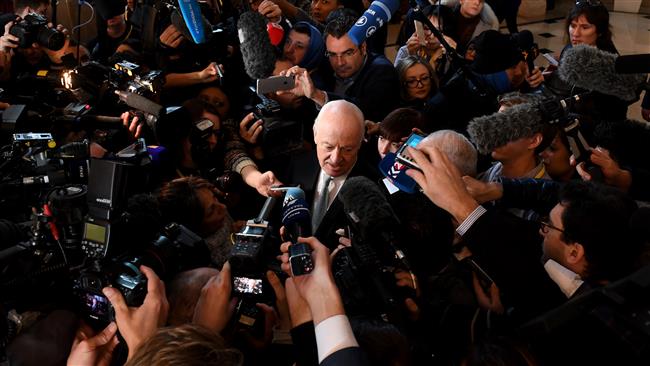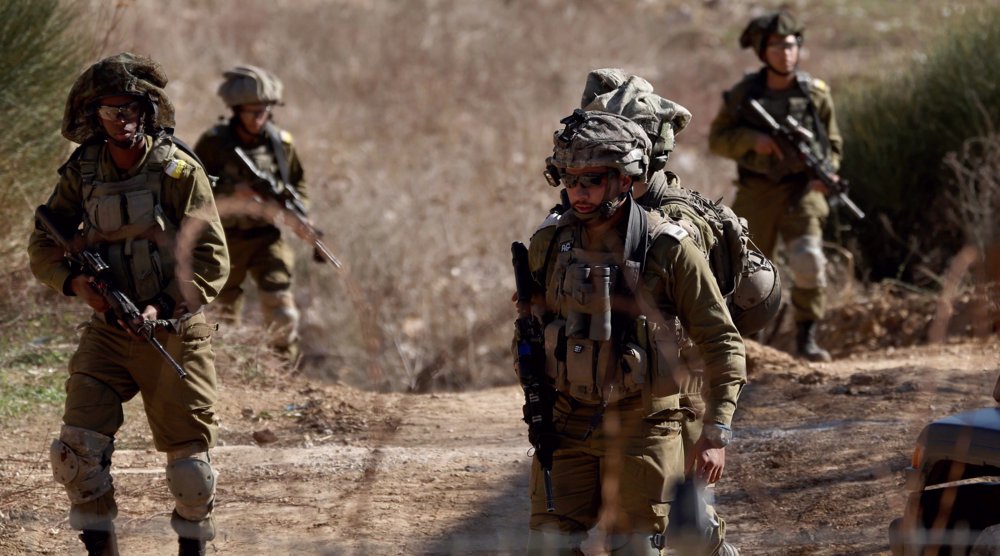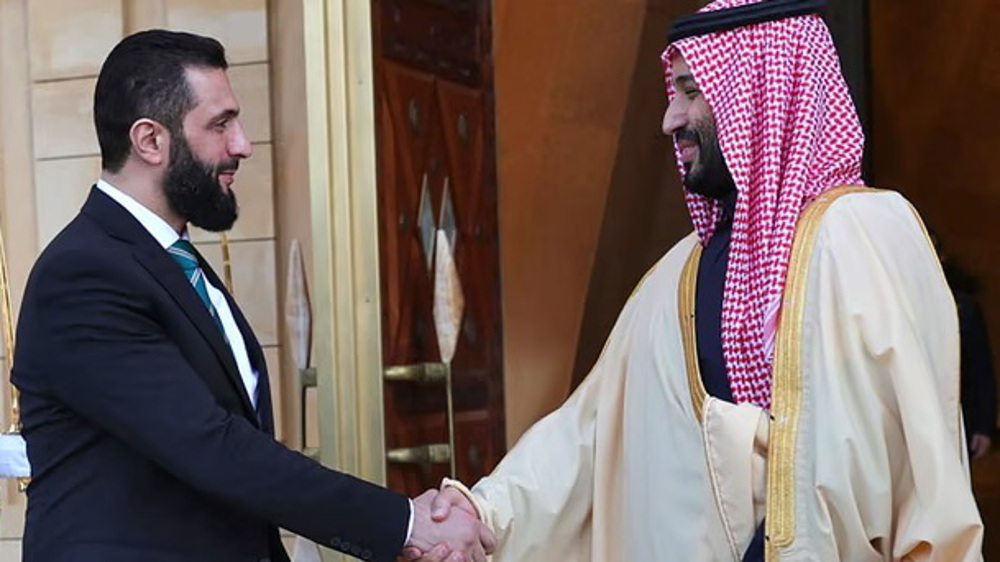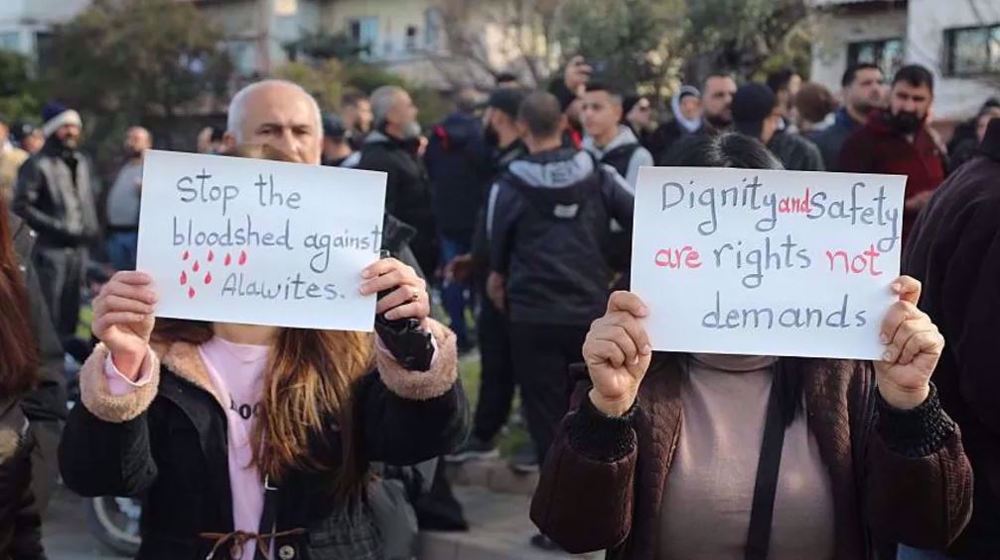Astana talks on Syria enter second day
A second day of Syrian peace talks has started in Kazakhstan's capital of Astana, amid talk of an extension of the originally two-day negotiations.
The representatives of the Syrian government and opposition convened for the second day of the talks on Tuesday to explore whether or not they can find a mutually-acceptable solution to the almost-six-year-long conflict in their country.
The new round is reportedly to see the participation of the political opposition instead of militants on the opposite side.
Iran, Russia, and Turkey have organized the talks. The three also play intermediary roles at the talks, where a United Nations (UN) envoy for Syria is also present.
‘Agreement on ceasefire monitoring reached’
Meanwhile, a breaking item on the website of Turkey’s Anadolu news agency said Tehran, Moscow, and Ankara have agreed on a “mechanism to guard against cease-fire violations in Syria.”
There has been no confirmation of the development by Iranian or Russian officials, yet, but it is reportedly one of the issues to be included in the final statement of the talks.
‘Not far from a final statement’
Staffan de Mistura, the UN envoy, said on Tuesday that the sides were very close to consensus on the final statement.
“We are not far from a final declaration,” de Mistura said. “There are very intense discussions because this is not about a paper, this is about a cessation of hostilities which means Syrian lives.”
However, some reports indicate that the sides are still divided over the text of the draft statement.
“If the guarantors want the success of this meeting, they have to do something more on the ground,” said senior opposition negotiator Osama Abu Zaid. “There are pledges from the Russian side to reinforce the ceasefire in areas where there are continued violations, but we’re waiting for more than just statements.”

An opposition source also said they were now discussing a draft of the final text with their Turkish backers. Government sources said they were also consulting over the draft statement.
Some reports also say that the negotiations may be extended but delegates have not confirmed an extension, yet.
Analysts say the latest attempt at negotiating peace, which is a first one seeing cooperation among Tehran, Moscow, and Ankara, has “sidelined” the Unites States. While the US ambassador to Kazakhstan is in attendance, he is there only as an observer.
Last month, Iran, Russia, and Turkey worked out a deal enabling the evacuation of civilians and militants from Aleppo as the Syrian forces were about to retake the northwestern city from Takfiri militants. That also paved the way for a ceasefire applying to the entire country, which has been largely holding.
In contrast, numerous rounds of UN-brokered talks and attempts by other players to enforce a ceasefire have failed in the past.
The ongoing talks mainly focus on consolidating the newly-negotiated ceasefire.
Iran’s delegation at the talks is headed by Deputy Foreign Minister Hossein Jaberi Ansari.
At the end of the first round, the Iranian, Russian, and Turkish delegations held a trilateral meeting to work on the draft of the final statement.
‘Joint government-opposition work’
On Monday, Syria’s Minister of State for National Reconciliation Affairs, Ali Haidar, said the talks were also addressing the prospect of the Syrian government and opposition carrying out joint anti-terrorism efforts and an absolute differentiation of the opposition from terrorist groups. The ceasefire and the talks have already excluded the Takfiri terrorist groups of Daesh and al-Nusra based on a consensus between Damascus and its opponents.
What happened on day one?
At the end of the first day, delegates voiced both hope and concern.
Bashar al-Ja’afari, who is Syria’s UN ambassador and the head of the Syrian delegation in the Astana talks, criticized the delegates of the foreign-sponsored militant groups over raising “unrealistic” issues during the first day.

Mohammed Alloush is the chief negotiator for the armed opposition and is the head of the so-called Jaysh al-Islam.
Russian President Vladimir Putin’s point man on Syria, Alexander Lavrentiev, who is heading the Russian delegation, said, “If at the beginning, the members of the [opposition] delegation were somewhat under stress, the level of distress significantly decreased.”
He added that the opposition understood that Russia “is a reliable partner, who remains true to its words, and if it guarantees any actions, or guarantees any agreement, you can rely on it.”
Lavrentiev said, “All the parties have shown [a] reasonable approach” during the first day. “At the end, [parties] tried to avoid some actions that could lead to the failure of this very important — as we consider it — international event.”
Meanwhile, UN-brokered talks will be held in the Swiss city of Geneva in February according to schedule.
Lebanese parliament speaker rejects any postponement of elections
VIDEO | Gazans break Ramadan fast amid rubble of their destroyed homes
Tehran reaffirms drive to deepen defense ties with West African countries
US envoy’s remarks on Israeli West Asia expansion shows Muslim world targeted: Houthi
Iran says any agreement with US must fully safeguard national rights, interests
VIDEO | Press TV's news headlines
Trump administration terminates aid programs to seven African countries: Report
IRGC warship back home after long-range deployment for BRICS naval drills














 This makes it easy to access the Press TV website
This makes it easy to access the Press TV website